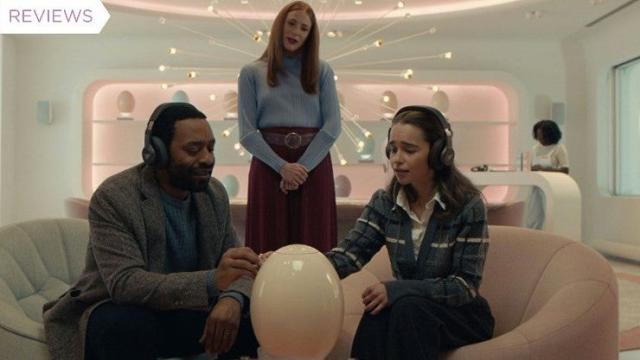It’s fitting that new sci-fi film The Pod Generation centres on a circular-shaped object because it so disappointingly drops the ball. What starts as a fascinating blend of futuristic technology, sci-fi aspirations, and gender commentary eventually gets to a point where it all falls apart. Everything that the film was seemingly building towards fizzles to nothing and the considerable goodwill most of the film raised goes away in a flash.
Written and directed by Sophie Barthes, The Pod Generation is set in an almost recognisable near future where food is 3D printed, AI assistants help with daily chores, and, if they so choose, a person or couple can have a baby in a pod. This is an idea that Rachel (Game of Thrones’ Emilia Clarke) is really into. Having a baby in a pod, instead of naturally, would allow her to continue to work at her very successful job and not put the usual physical stresses on her body. Unfortunately her husband Alvy (Doctor Strange and Firefly’s Chiwetel Ejiofor) is against this. A botanist in a world filled with holographic trees, he thinks babies should arrive the natural way. Which is convenient because he isn’t the one whose body would have to do that.
Amid a sea of super cool sci-fi technology and stellar production design, this debate about pregnancy and gender roles drives the early sections of the film. And it’s all very provocative and interesting. There’s healthy debate on both sides and lots of cool sci-fi touches along the way. Of course, there wouldn’t be much of a movie if Rachel and Alvy didn’t choose the pod — so they do, and then the movie gets even better. Barthes’ tech-driven solutions for in-utero parenting (like feeding the baby or playing it music via an app) are incredibly clever and fun to think about. In fact, the more questions the film answers about the pod process, the more questions the viewer is likely to have because the idea is endlessly wonderous.
Both Alvy and Rachel change drastically during the pregnancy, reversing stereotypical gender roles and questioning the nature of pregnancy itself; as this is happening, everything about The Pod Generation is looking great. Both Clarke and Ejiofor do solid work, exploring the many multitudes one must go through when deciding to, and following through with, bringing a new life into the world. Even when the novelty of the film’s technology and sci-fi premise wears off, their star power and charisma keep things afloat.
At a certain point though, everything changes. The characters make some very uncharacteristically bad decisions, the movie kind of glosses over it all and before you know it, the credits are rolling. Truly, it’s almost shocking how a narrative with so much potential and care can go off the rails so quickly. It’s akin to writing the first 100 pages of a script on a computer and the last 20 in crayon. You almost can’t believe everything you’re seeing because it feels so at odds and rushed in comparison to the rest of the movie.
Even with that hugely disappointing ending though, The Pod Generation does merit some mention. The lead performances are good, it has a great look to it, and the world-building is incredibly imaginative. You just wish that thematically the movie could live up to all that, or at least articulate its purpose better. Because, as it stands now, it does not.
The Pod Generation premiered this week at the Sundance Film Festival. No word yet on a release date.
While you’re here, why not check out Gizmodo Australia’s guide to what’s streaming this month on Netflix, Prime Video, Disney+, Stan, Binge and more. We’ve also got one for all the good movies coming out in 2023 if that’s more your thing.
